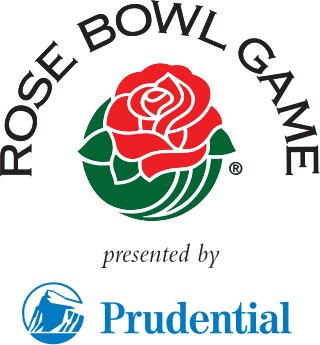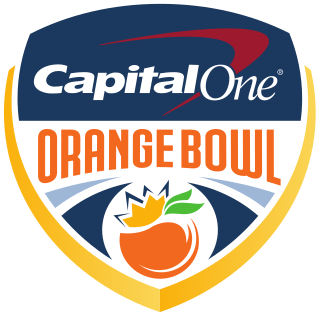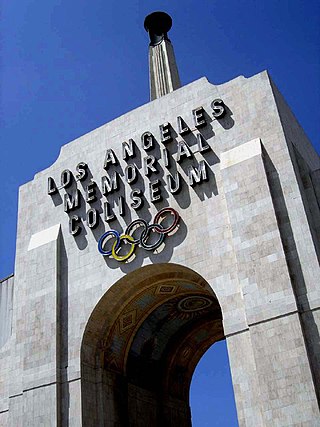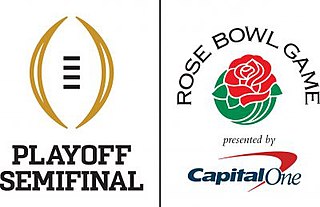
Pasadena is a city in Los Angeles County, California, United States, 11 miles (18 km) northeast of downtown Los Angeles. It is the most populous city and the primary cultural center of the San Gabriel Valley. Old Pasadena is the city's original commercial district.

The Rose Parade, also known as the Tournament of Roses Parade, is an annual parade held mostly along Colorado Boulevard in Pasadena, California, United States, on New Year's Day.

The Rose Bowl Game is an annual American college football bowl game, traditionally played on January 1 at the Rose Bowl in Pasadena, California. When New Year's Day falls on a Sunday, the game is played on Monday, January 2. Nicknamed "The Granddaddy of Them All" by broadcaster Keith Jackson, it was the first postseason football game ever established. The Rose Bowl Game was first played in 1902 as the Tournament East–West football game, and has been played annually since 1916. Since 1945, it has been the highest attended college football bowl game. The game is a part of the Pasadena Tournament of Roses Association's "America's New Year Celebration", which also includes the historic Rose Parade. Winners of the game receive the Leishman Trophy, named for former Tournament of Roses presidents, William L. Leishman and Lathrop K. Leishman who played an important part in the history of this game.

The Los Angeles Memorial Coliseum is a multi-purpose stadium in the Exposition Park neighborhood of Los Angeles, California, United States. Conceived as a hallmark of civic pride, the Coliseum was commissioned in 1921 as a memorial to Los Angeles veterans of World War I. Completed in 1923, it will become the first stadium to have hosted the Summer Olympics three times when it hosts the 2028 Summer Olympics, previously hosting in 1932 and 1984. It was designated a National Historic Landmark on July 27, 1984, a day before the opening ceremony of the 1984 Summer Olympics.

The Rose Bowl is an outdoor athletic stadium located in Pasadena, California. Opened in October 1922, the stadium is recognized as a National Historic Landmark and a California Historic Civil Engineering landmark. At a modern capacity of an all-seated configuration at 89,702, the Rose Bowl is the 16th-largest stadium in the world, the 11th-largest stadium in the United States, and the 10th-largest NCAA stadium. The stadium is 10 miles (16 km) northeast of downtown Los Angeles.
The National Football League (NFL) has had a long and complicated history in Los Angeles, the second-largest media market in the United States. Los Angeles became the first city on the West Coast to host an NFL team when the Cleveland Rams relocated to Los Angeles in 1946; they played at the Los Angeles Memorial Coliseum from 1946 until 1979. In 1960, a charter American Football League franchise, the Los Angeles Chargers, began playing in the Coliseum. The Chargers moved to San Diego after their inaugural season, where they eventually joined the NFL as part of the AFL–NFL merger. The Rams moved to suburban Anaheim, California, in 1980. A surprising move in 1982 brought the Oakland Raiders to the Coliseum to become the Los Angeles Raiders.

California has 21 major professional sports franchises, far more than any other US state. The San Francisco Bay Area has six major league teams spread amongst three cities: San Francisco, Oakland and San Jose. The Greater Los Angeles Area has ten major league teams. San Diego and Sacramento each have one major league team.

Jackie Robinson Stadium is a college baseball park in Los Angeles, California. It is the home field of the UCLA Bruins of the Big Ten Conference. Opened 43 years ago in 1981, it is the smallest ballpark in the conference, with a seating capacity of 1,820. It is named after former Bruin athlete Jackie Robinson, the first African-American major league baseball player of the modern era.

Memorial Park station is an underground light rail station on the A Line of the Los Angeles Metro Rail system. It is located at Holly Street and at the end of Arroyo Parkway in Pasadena, California. The station is named after the nearby Memorial Park and is situated on the northern edge of Old Town Pasadena.

The Greater Los Angeles area is home to many professional and collegiate sports teams and has hosted many national and international sporting events. The metropolitan area has twelve major league professional teams: the Los Angeles Dodgers, the Los Angeles Lakers, the Los Angeles Rams, the Los Angeles Angels, the Los Angeles Chargers, the Los Angeles Clippers, Los Angeles FC, the LA Galaxy, the Los Angeles Kings, the Anaheim Ducks, the Los Angeles Sparks, and Angel City FC of the National Women's Soccer League. The Los Angeles metropolitan area is home to nine universities whose teams compete in various NCAA Division I level sports, most notably the UCLA Bruins and USC Trojans. Between them, these Los Angeles area sports teams have won a combined 105 championship titles. Los Angeles area colleges have produced upwards of 200 national championship teams.
Originally titled the "Tournament East–West football game", what is now known as the Rose Bowl Game was first played on January 1, 1902, at Tournament Park in Pasadena, California, starting the tradition of New Year's Day bowl games.
The 1984 Rose Bowl game, played on Monday, January 2, was the 70th edition. The unranked UCLA Bruins upset the #4 Illinois Fighting Illini by a score of 45–9.

Pasadena Tournament of Roses Association, created by the efforts of Charles Frederick Holder and Francis F. Rowland, is the non-profit organization that has annually produced the Rose Parade on New Year's Day since 1890 and the Rose Bowl since 1902. "America's New Year Celebration" is "a festival of flowers, music and equestrians and sports unequaled anywhere in the world", according to the Tournament of Roses. The association has 935 volunteer members and the members spend some 80,000 combined work-hours to stage the events.

The 1923 Rose Bowl, played on January 1, 1923, was an American Football bowl game. It was the 9th Rose Bowl Game. The USC Trojans defeated the Penn State Nittany Lions 14–3. Leo Calland, a USC guard, was named the Rose Bowl Player of the Game when the award was created in 1953 and selections were made retroactively. It was the first bowl game appearance for both the University of Southern California and Pennsylvania State University football teams. It was also the first Tournament of Roses football game held in the newly constructed Rose Bowl Stadium, although other games had been played in it prior to this one.

The Orange Bowl is an annual American college football bowl game that has been played annually in the Miami metropolitan area since January 1, 1935. Along with the Sugar Bowl and the Sun Bowl, it is one of the oldest bowl games in the country behind only the Rose Bowl, which was first played in 1902 and has been played annually since 1916.

For the 1984 Summer Olympics, a total of thirty-one venues were used. The Los Angeles Memorial Coliseum and the Rose Bowl, two venues previously used for the 1932 Summer Olympics, were used for the 1984 Games. Between the 1932 and the 1984 Summer Olympics, the expansion of professional sports teams assisted in the growth of the facilities that would be used for the 1984 events. Only two new permanent venues were constructed, both using corporate sponsorship, though neither were mentioned in the official Olympic report. Many other venues had temporary adjustments and returned to their normal usage once the 1984 Olympics were completed. Stanford Stadium in Palo Alto and the Rose Bowl later served as venues for the Super Bowl, the FIFA World Cup, and the FIFA Women's World Cup.

The 2017 Rose Bowl was a college football bowl game played on January 2, 2017 at the Rose Bowl stadium in Pasadena, California. This 103rd Rose Bowl Game matched the Big Ten Conference champions Penn State Nittany Lions against the USC Trojans of the Pac-12 Conference, a rematch of the 1923 and 2009 Rose Bowls, the former the first appearance for either team in the bowl and the latter the most recent appearance for either team. It was one of the 2016–17 bowl games that concluded the 2016 FBS football season. Sponsored by the Northwestern Mutual financial services organization, the game was officially known as the Rose Bowl Game presented by Northwestern Mutual. USC received the Lathrop K. Leishman trophy for winning the game.
Fiesta Park was a grandstand and sports and entertainment venue in South Park, Los Angeles, California. From 1894 to 1916, it served as venue for various exhibitions and festivals, as well as a field for USC Trojans football games.
The 2028 Summer Olympics are scheduled to be held in Los Angeles, California, United States, from July 14–30, 2028. The Games will be hosted in and around Greater Los Angeles and Los Angeles County. The city's bid relied on a majority of existing venues and venues that had already been under construction or were planned regardless of the Games. The majority of venues are divided into clusters known as "sports parks", situated in Downtown Los Angeles, the San Fernando Valley, Carson, and Long Beach. No new permanent venues are being built specifically for the Games.

The 2021 Rose Bowl was a college football bowl game played on January 1, 2021, with kickoff at 3:00 p.m. CST at AT&T Stadium in Arlington, Texas. The 107th playing of the Rose Bowl Game, it was one of two College Football Playoff (CFP) semifinal games; it pitted two of the four teams selected by the College Football Playoff Selection Committee—Notre Dame from the Atlantic Coast Conference (ACC), and Alabama from the Southeastern Conference (SEC), with its winner facing the winner of the Sugar Bowl, Ohio State, at the 2021 College Football Playoff National Championship. It was also one of the 2020–21 bowl games concluding the 2020 FBS football season.


















